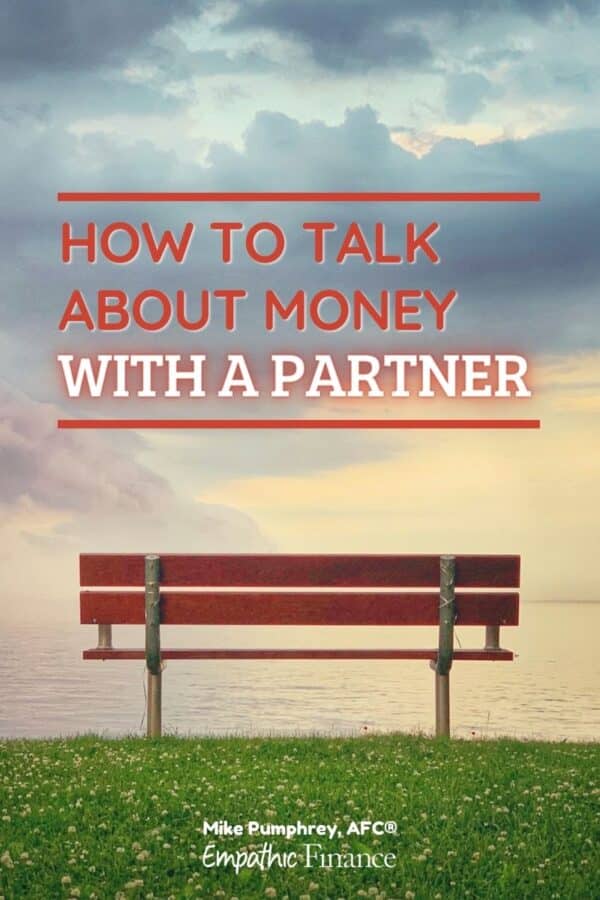Connecting with a partner around money is one of the most powerful ways to grow closer and more aligned. Here’s how to have the talk.
There isn’t one way to handle money in a relationship. That’s not surprising, because there isn’t one way to handle a relationship. For instance, many people engage in multiple intimate relationships simultaneously (and ethically) And of course, there are more types of relationships than intimate ones.
But if we concern ourselves only with intimate partnerships, if you are in one of those, then chances are that you are entwined financially in some way.
And yet, some people in relationships do not talk about money at all, from a bigger picture perspective, or even a what-are-we-doing-with-the-paycheck? perspective.
If this sounds like you, it’s time to change that.
Table of Contents
More than one way to share finances
The way I see it, there are multiple ways to share finances:
- You can share everything. One account; total visibility.
- You can share most things, with individual accounts for some discretionary spending.
- You can keep most things separate, with a shared account for some bills and expenses.
- You can keep everything separate.
- You can have one person take care of everything and dole out an allowance to the other.
Contrary to popular opinion, I don’t believe you need to share finances when you’re in an intimate relationship. It’s not a sign of bad relationship health if you don’t.
The problem is when that happens without any conversation.
And that’s true in any of the above scenarios. A conversation is mandatory, not just to the health of your finances, but also to the health of your relationship.
What happens when you don’t talk
Money affects every aspect of our lives in some way, whether we like it or not.
When you don’t talk about finances, in some ways, you’re not talking about your life. You’re not talking about future plans. You’re not dreaming together.
It’s impossible to be on the same page with someone else about anything when you don’t communicate about it. And yet, this is just what many people do when it comes to money, especially (and ironically) when money stress is higher.
According a recent report in the Journal of Consumer Psychology (paywalled, but referenced in the New York Times) when people experience high stress, “they are less likely to communicate with their partner about finances due to greater anticipated conflict.”
“They anticipate conflict, so they’re choosing not to have these conversations at all,” said Emily Garbinsky, associate professor of marketing and management communication at Cornell’s business school and one of the study’s authors.
And what problem gets better when you avoid it?
What happens when you do talk
I’ve always said that for people who don’t want to think about their own finances, it’s like when you were a kid and you were worried about there being monsters under the bed (or in the closet).
Your parent or guardian would come in, open the closet door, look under the bed, and show you that there were no monsters at all.
Thinking about your own finances, there are no monsters under the bed. And the same can usually be said about talking about finances with your partner.
Assuming (as I must) that you are all fundamentally on the same page about your commitment, then even if you have differing views about the way you spend money, you can agree that you’re both working toward strengthening that commitment.
(And if you’re not on the same page, well, that would be good to know too, wouldn’t it?)
How to talk about money
Having financial talks can strengthen your relationship in massively powerful ways. But only if you do it right.
The most important aspect is to come in with a sense of curiosity. Even if you’ve been irritated or hurt by actions your partner has done in the past, it’s important to want to understand what makes them tick.
So this is not a chance to right past grievances. If this is the first time you’re talking about money in a big way, you want to assuming good intentions, and seek to understand.
After all, just because someone does things differently, doesn’t mean that they are wrong.
Set aside some time to have conversation. Maybe twenty minutes to an hour for the first time. You don’t want this to be an all-day summit.
And don’t make it a We Have To Talk kind of conversation. You can frame it in a loving way, as a way to grow closer.
The best kinds of financial conversations start high-level, with dreaming. Talk about what you want for yourself and your partnership. Talk about what’s important. Then ask what’s important to them.
The more you talk, the more you listen, and the most you understand, the more you’ll feel connected. And the more connected you feel, the more confident you’ll be in moving on to the more nuanced practicalities of managing your money. That part may not happen during that first conversation though, and that’s okay. The idea is that you’ll continue the conversation at another time, and build from there.
Not easy, but worth it
Having conversations about money are difficult, and the more stressed you are, the more difficult they can feel. But getting on the same page about money is one of the most powerful ways to connect with a partner, to say nothing of bettering your own financial situation. To me, that sounds worth it.



